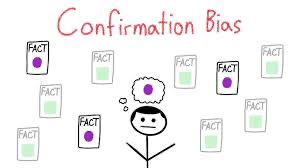Have you ever wondered why we favor our existing beliefs? Well, that is because of confirmation bias. Confirmation bias, by definition, is known as "our underlying tendency to notice, focus on, and give greater credence to evidence that fits with our existing beliefs". Think about it like you were reading a newspaper that has a lot of information, but you already have a knowledge of the topic. Because of the confirmation bias, you would be more likely to believe the facts that you already know, becuase it is confirming your existing beliefs. In contrast, the facts that you haven't heard and may not be so sure about, you may not believe. It is almost as if you are reading with blinders on, and only believing what you want to believe.
 However, when looking at the bigger picture, confirmation bias can have troubling effects. Confirmation bias can keep us as individuals from having an open mind, resulting in a fixed mindset. A fixed mindset allows no room for growth. If we are only reading and believing things that confirm what we already think, there is also no room for growth and can be detrimental to our learning. It can almost lead to ignorance. News is one of the biggest problems that confirmation bias affects. When individuals believe one view, they will only read and consume news from networks that align with their beliefs. Imagine you were watching the election and following the candidates from a far right leaning network. This would be ignorant, because you would only get half the facts. This leads to one of the biggest problems in society.
However, when looking at the bigger picture, confirmation bias can have troubling effects. Confirmation bias can keep us as individuals from having an open mind, resulting in a fixed mindset. A fixed mindset allows no room for growth. If we are only reading and believing things that confirm what we already think, there is also no room for growth and can be detrimental to our learning. It can almost lead to ignorance. News is one of the biggest problems that confirmation bias affects. When individuals believe one view, they will only read and consume news from networks that align with their beliefs. Imagine you were watching the election and following the candidates from a far right leaning network. This would be ignorant, because you would only get half the facts. This leads to one of the biggest problems in society.
 The effects of confirmation bias are evident in every part of our lives; socially and personally. The problem with confirmation bias is that many individuals do not think this is something that affects them. However, the truth is that it affects everyone whether we recognize it or not. The close-mindedness that confirmation bias enforces can keep us as individuals from growing and connecting with others. As everyone knows, a fixed mindset is one of the top problems with our society today and confirmation bias is only making fixed mindsets more prevalent. So next time you decide to shut your computer after reading what only confirms your own beliefs, try scrolling further, and also recognizing other views in order to avoid this confirmation bias.
The effects of confirmation bias are evident in every part of our lives; socially and personally. The problem with confirmation bias is that many individuals do not think this is something that affects them. However, the truth is that it affects everyone whether we recognize it or not. The close-mindedness that confirmation bias enforces can keep us as individuals from growing and connecting with others. As everyone knows, a fixed mindset is one of the top problems with our society today and confirmation bias is only making fixed mindsets more prevalent. So next time you decide to shut your computer after reading what only confirms your own beliefs, try scrolling further, and also recognizing other views in order to avoid this confirmation bias.
Confirmation bias can be good in some cases, but can also be extremely detrimental to us as a society. Confirmation bias helps individuals to stay confident in their beliefs. When an individual finds information that supports their preexisting ideas, it confirms this information and in turn, makes them more confident. This eliminates mental conflict which can also be known as cognitive dissonance. Cognitive dissonance is a mental state of discomfort that occurs when something does not line up with what is said. This puts a stress on our minds which obviously, no one is going to enjoy.
Socially, confirmation bias can impact relationships and day-to-day interactions. Since confirmation bias essentially reiterates a belief that an individual already has, it can easily strengthen in-group biases. In-groups and out-groups are the social groups that you identify with. Your in-group is the group who you as a person belong to in regards to the individuals that you spend time with and share common beliefs with. Your out-group is the exact opposite, the people that do not have beliefs like your own. Since these individuals do not share your beliefs, naturally we as individuals tend to not enjoy spending time around them. Confirmation bias reinforces our beliefs, so when we read things that align with what we already know, we believe it instantly. As a group, our whole in-group will tend to believe these things and stick together, which strengthens in-group biases. This can create a huge problem socially because it can create social divides between groups with different belief systems.



No comments:
Post a Comment